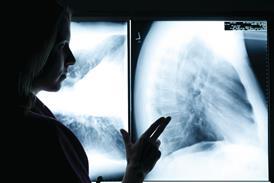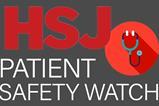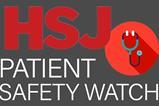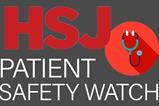HSJ is now hosting the Patient Safety Watch newsletter, written by Patient Safety Watch chief executive James Titcombe.
Good afternoon and welcome to this fortnight’s Patient Safety Watch newsletter.
Charities call for urgent improvements to maternity services
A report by Sands and Tommy’s has warned the government’s target to half stillbirths and neonatal deaths by 2025 is stalling, as the rates for both have begun to creep back up.
Robert Wilson, head of the charities’ joint policy unit, is quoted in The Observer as saying: “Losing a baby in pregnancy or shortly after birth is not just ‘one of those things’. Too often losses are occurring because of care that is not in line with nationally agreed standards. There are also significant workforce pressures, which affect the ability to deliver safe care.”
Overall, the report paints a concerning picture with progress stalling and a risk of going backwards, highlighting that:
- Nationally-agreed standards of care are too often not being followed, which is contributing to avoidable deaths.
- The voices of bereaved parents are still not being effectively heard and acted upon.
- There are no national targets to reduce inequalities between ethnic groups or areas of deprivation, despite multiple reports highlighting the impact of racism and discrimination which some individuals experience when engaging with health services.
- Staff report working in an increasingly under resourced and stretched system which is having an impact on people’s experience of care.
- Many NHS Trusts and Boards are still not learning from the mistakes that cost lives when things go wrong.
The full report is available here.
HSIB’s Maternity Programme in the spotlight
As a big supporter of the need for Health Safety Investigation Branch’s maternity investigation programme, last week’s reporting on Chanel 4 made for concerning and sad viewing.
Victoria Macdonald reported, that in her whole career she had never been contacted by so many whistle-blowers about one organisation. The two part expose included powerful interviews with bereaved parents who felt let down by the investigation process as well as allegations of bullying, misogyny and poor quality investigations.
HSIB’s maternity investigation programme was established with the very best of intentions – to help hospitals learn lessons when a baby or mother is harmed or dies. The programme is currently in the process of transition, due to be hosted by the Care Quality Commission later this year. As part of this process, let’s hope that the concerns raised by Chanel 4 and the experiences of the families who spoke on the programme are properly reviewed and the necessary lessons learned.
Care Quality Commission calls for “immediate improvements” as East Kent maternity service rates ‘inadequate’.
Staying on the theme of maternity safety, The East Kent Hospitals NHS Trust has had its maternity services downgraded to “inadequate” by the CQC this week. This follows unannounced inspections in January of the William Harvey Hospital in Ashford and the Queen Elizabeth the Queen Mother (QEQM) Hospital in Margate.
According to ITV news, inspectors found that vital resuscitation equipment wasn’t always easily accessible, day care facilities were “poor” and “chaotic”, while some fire exit doors weren’t working properly.
Speaking to the BBC, Helen Gittos, whose baby Harriet was born at the East Kent trust’s Queen Elizabeth the Queen Mother Hospital in 2014 and died eight days later, said:
“When my daughter Harriet was born, the then head of midwifery was so concerned about safety that she thought that the William Harvey in particular should be closed down…Here we are, almost nine years later, in a similar kind of situation. What has been happening has not worked…I keep being surprised at how possible it is to keep being shocked about all of this, but I am shocked, that under so much scrutiny, and with so much external help, it’s still the case that so much is not right.”
“The problems that are revealed are so fundamental that we have to do things differently.”
When putting these newsletters together, I don’t set out to focus on stories relating to maternity safety, but not a day seems to go by when a headline relating to unsafe maternity care isn’t in the news. Previous newsletters have highlighted that currently, the cost of harm in our maternity services is over twice the investment we make in the actual provision of maternity care itself.
Despite a considerable national strategy and policy focus in recent years, it’s becoming increasingly clear that we simply aren’t making the progress in maternity services that’s needed.
It’s time for a step change in approach and a real investment in maternity services so that this situation can be reversed.
In other news this edition:
Rollout of mandatory outcomes registry begins
NHS England’s new mandatory medical device outcome registry – which was created in response to the First Do No Harm review – is launching this month. Trusts must now start submitting full data on surgeries which include a high-risk medical device, such as an implant. This data includes key details about the patient, the clinician responsible for the operation, and the devices being implanted.
‘But I wasn’t in a safe place at all’
A Sky News investigation has revealed multiple patient safety concerns about the Wotton Lawn mental health unit in Gloucester. These include patients being hastily discharged before they are ready to leave and could still pose a danger to themselves, staff sleeping while on duty, and patients going missing.
One patient described how he managed to access the building’s roof and jump off. He told the broadcaster: “I was hearing voices and I should have been in a safe place, where I can’t get out and there are no roofs I could jump off. But I wasn’t in a safe place at all.”
Gloucestershire Health and Care Foundation Trust, which runs the facility, apologised “to anyone who hasn’t had good experience of our care”, adding: “Our colleagues work hard, often in very difficult circumstances, to support our patients to recover and be safely discharged every day, and we receive regular positive feedback. We know, however, that we do not always get things right.”
Ward closures and flooding puts patient safety at risk at hospital promised a rebuild
Ruth Charlton, the outgoing chief medical officer of Epsom and St Helier University Hospitals Trust, warned in The Observer that patient safety could soon be on the line if the south London hospital isn’t replaced soon. She wrote: “Right now, we are delivering safe care – but it’s not easy in such a dilapidated and unpleasant environment, and I fear we won’t be able to provide the level of care we’d like to – or should be – for much longer.”
The hospital’s replacement is among the new hospitals scheme promised by former prime minister Boris Johnson.
Troubled trust sent five safety warnings in six weeks
East Kent Hospitals University FT – which has recently been the centre of a high-profile maternity scandal – received five emails and letters in six weeks from its local integrated care board, highlighting serious safety concerns. HSJ has revealed these include concerns over whether the trust was learning from serious incidents, adult safeguarding, and an incident involving the tranquillisation of a teenager in one of its emergency departments.
Although papers from the trust revealed it was aware of the issues the ICB had raised, it also admitted the ICB and NHSE were concerned it had not done enough at sufficient pace to address the risks.
Sharing some good stuff….
Monitoring May
To finish this edition of the newsletter, I’m please to be able to share a short blog written by brilliant midwife Catherine Hopely about a fantastic initiative called “Monitoring for May” – a collaboration between the Jessop Wing, Sheffield, and Leicester University Hospitals’ Trust. This brilliant work and the resources shared will be of interest to everyone working in maternity services.
“Monitoring May” commenced in May 2021 from humble beginnings with the aim of promoting our new Fetal Monitoring Guideline in Mid-Yorkshire Hospitals’ Trust. We were moving to a more physiological approach to interpreting the fetal heart in labour and we decided to launch this over the month of May, hence “Monitoring May” was conceived. I then tweeted this initiative, and Sarah Blackwell, the Fetal Monitoring Lead at Leicester University Hospitals’ Trust and founder of the National Fetal Monitoring Network, asked if she could also be involved. From this collaboration and recognising the opportunity to answer the call to action documented in the initial “Ockenden Report” (2020) for fetal monitoring leads to “raise the profile of fetal monitoring” we seized the opportunity for “Monitoring May” to become a national learning initiative with the aim of raising recognition, communication, escalation, and action in relation to fetal monitoring concerns.
In its inaugural year, “Monitoring May” ran over MS Teams every working day in May, the fetal monitoring leads for each Trust disseminated the link with their teams and thus the event is and was free for all to attend. Each week had a dedicated theme which included; Monitoring in low risk labour/those who decline continuous monitoring, The antenatal CTG and situational awareness, The intrapartum CTG and human factors, and HIE and escalation of deterioration. In 2022, Monitoring May evolved and we ran this over one week but with longer, dedicated days. We used the above themes but also added safer maternity care and the impact of covid-19. At Sheffield Hospitals’ FT with Leicester University Hospitals Trust, we have just completed Monitoring May 2023 which has again been hugely successful.
This event, a collaboration between the Jessop Wing, Sheffield, and Leicester University Hospitals’ Trust, is the result of people’s passion for ensuring we do all we can to ensure we have healthy parents and healthy babies. We demonstrate though Monitoring May, how to identify those pregnancies or labours that may need us to act sooner, with the aim of reducing perinatal morbidity and unnecessary separation of mothers and babies after birth. Past events have made us all acutely aware of the impact of fetal surveillance and listening to parents has in improving the experience of parents, some of whom have endured terrible outcomes in the past. We recognise that none of this is achievable without good and effective communication between all the relevant specialities encompassing midwifery, obstetricians, anaesthetists, and neonatology, but ultimately the woman or birthing person. It is our duty to make sure that we do our best for our women and families and Sarah and I hope these study days give people the confidence and power to be able to do so
All the sessions from this years Monitoring for May event are available here.
That’s all for this edition. Please look out for our next newsletter which will be published slightly later than usual, on 16 June 2023.
Thanks for reading and stay safe.
































No comments yet